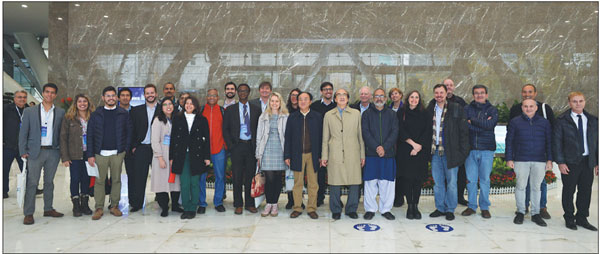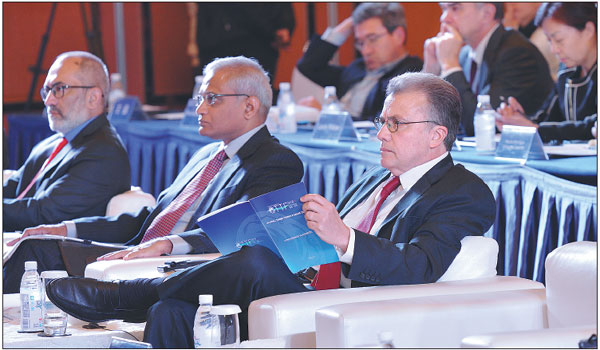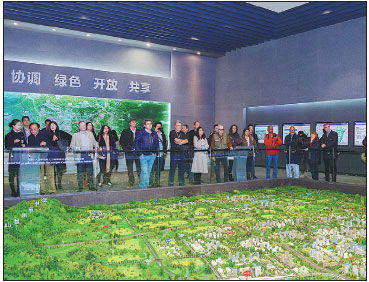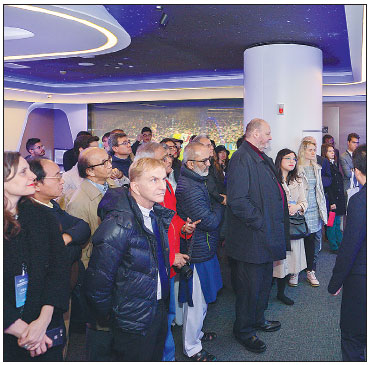Think tank forum an international success
Chengdu attracts experts, opinion leaders from around the world to discuss global innovation and governance, Yuan Shenggao reports.
As a prominent representative of China's new first-tier cities, Chengdu has caught the eyes of many global think tanks over the past several years. A recent high-level think tank forum again made the city a hotspot that saw experts and opinion leaders gather from all over the world.
The Global Think Tanks Forum 2018, held from Nov 22 to 23, was co-organized by China Foreign Languages Publishing Administration, the Academy of Contemporary China and World Studies and Chengdu's city government. Think tank leaders and renowned professionals from 18 countries discussed the "cooperation and development of think tanks and innovation in global governance" at the event.
Three sub-forums focused on the Belt and Road Initiative and changes in global governance, cooperation and new methods for global governance, and reform and opening-up, as well as new driving forces for global governance. The event saw the publication of the Chengdu Consensus of Global Think Tanks Forum 2018, a report on the views of countries involved in the Belt and Road Initiative about China and a report assessing the role of China in global governance.
Solidarity, mutual assistance, equity and justice are the key values of global governance, while inclusiveness, mutual benefit and win-win results are its major goals, according to the consensus.
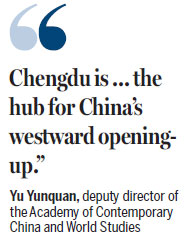
The consensus stated that extensive consultation, joint efforts and keeping up with the times are the fundamental approaches to global governance. Enhancing exchanges and cooperation among think tanks is a major driving force for global governance. And more think tank experts are welcome to join the discussion around global governance innovation, it said.
"Chengdu is a city with more than 2,000 years of history, whose rich culture will shine in these modern times," said Fang Zhenghui, vice-president of China Foreign Languages Publishing Administration.
Since the international status and fame of Chengdu continue to rise, discussing global governance in Chengdu can "ignite the sparks of intelligence", according to Fang.
Zhou Mingwei, president of the Translation Association of China, said Chengdu offers a new development path for Chinese cities and gives of the image of a "promising future metropolis".
During the event, the Research Center on International Think Tanks Cooperation was founded in Chengdu, which will make the city a bridge for global communications and collaboration among think tanks, and will offer more support for the development of the city.
Wang Gangyi, senior researcher of the Academy of Contemporary China and World Studies, founder of the center, said that Chengdu's decades of experience in city governance is a precious treasure, which can provide more ideas for global governance.
The many higher education institutes and research institutes can also back the city in promoting the development of global governance.
"Chengdu is not only an important point on the Belt and Road, but also the hub for China's westward opening-up," said Yu Yunquan, deputy director of the Academy of Contemporary China and World Studies.
Chengdu is a pioneer for the implementation of new development philosophy. The newly established center can help the world gain a fresh and more comprehensive understanding of China, he said.
Since the city has become more global, the academy has brought foreign experts to study the city many times, Yu said. He added the center also aims to make such visits a routine and attract more think tanks to exchange ideas and find partners in the region.
Chengdu is home to many influential think tanks, such as the Institute of South Asia of Sichuan University, the Tianfu Think Tank and SWUFE Institution, he said.
The center will provide a platform for international communication, in a bid to better serve the development of the city and bring local think tanks to the world, he added.
Attendees visited the Chengdu Planning Exhibition Hall, Tianfu Software Park, the planning hall of Tianfu New Area and Tianfu Greenway, among other sites. They exchanged ideas about Chengdu's experiences in city development, reform and innovation, as well as how such experiences can boost innovation in global governance.
The local people are good at using the environment to serve life. The Dujiangyan Irrigation System is a good example, said Bruce Pickering, senior advisor from the Asia Society, United States, adding he is quite impressed by Chengdu's utilization and protection of the environment.
He said Chengdu is an international metropolis with modern elements and the city development and planning of Chengdu are similar to that of San Francisco. Compared with many other cities, Chengdu is more livable and has greater potential.
Eiichi Shindo, president of the Belt and Road Initiative Japan Research Center, said: "Chengdu has been an important junction point linking China and the West from ancient times to modernity. It will play an even more important role in the Belt and Road Initiative."
Chengdu is not only the center of western China, but also one of the key locations in the world, he added.
Ronnie Lins, director of the China-Brazil Center for Research and Business, said Chengdu links economic development closely with innovation and technological progress. He thinks the city has a bright future, given its rational layout and construction.
|
Attendees visit the Chengdu Planning Exhibition Hall during the Global Think Tanks Forum 2018, held in Chengdu from Nov 22 to 23. Photos provided to China Daily |
|
Participants attend the opening ceremony of the Global Think Tanks Forum 2018. |
|
Forum participants visit the Tianfu New Area in Chengdu. |
|
Attendees at the think tank forum visit companies in Chengdu. |
(China Daily 11/30/2018 page24)


